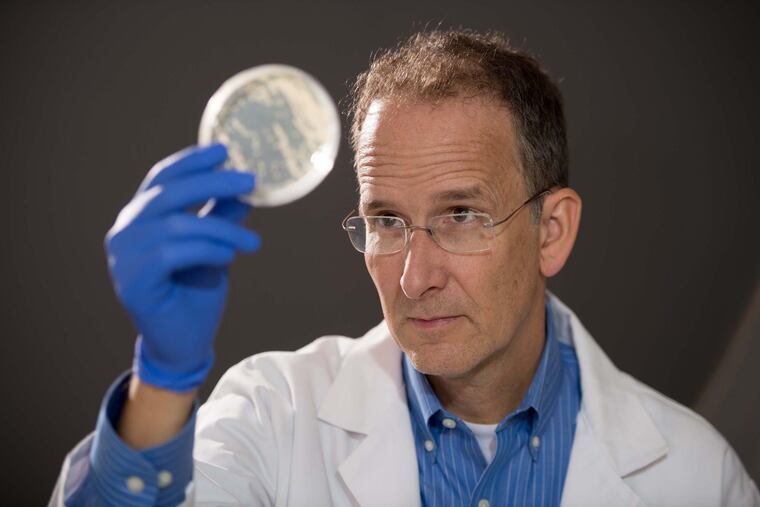Immunome IPO on target as investors bet big on gene, cell therapies
Immunome is the latest pre-product, pre-profit biotech to go public with an IPO.

UPDATE OCT. 2: Exton cell-therapy maker Immunome went public on schedule Friday morning, at a mid-range price of $12 a share, and has risen modestly in early trading.
EARLIER: Shares of Immunome Inc., an Exton firm that clones cancer-fighting “memory cells” from cancer survivors to target tumors in new patients, are expected to start trading on the Nasdaq national market as soon as Friday, under the symbol IMNM.
It is the latest in a string of local cell and gene therapy biotech companies that have offered initial public offering (IPO) shares to the public, often before they have products to sell. Many are built on science from researchers at area hospitals.
With the Federal Reserve keeping the price of money cheap, investors’ appetite for new stocks has rebounded after the market’s March collapse, when anti-coronavirus measures stalled the economy.
Profitable software companies such as Paoli-based Bentley Systems and King of Prussia-based Vertex have since posted successful share sales, burnishing the region’s tech credentials. And two Philadelphia-area biotech start-ups whose shares debuted this summer promptly rose above their IPO prices, as stock values inflate despite the economic slowdown.
Immunome will be the fifth Philadelphia-area biotech to go public this year, the count for the entire year last year.
Immunome expects that its investment bankers will sell up to 2.875 million shares, at a price of up to $13 a share.
It plans to use the $37.5 million in proceeds to develop drugs, and maybe buy other businesses, it told the U.S. Securities and Exchange Commission in a Sept. 24 filing. Without the IPO or other fund-raising, it expects to run out of cash by January.
That price implies that the whole company, including shares previously sold privately to large investors or granted to insiders, is worth up to $125 million.
Over the last five years, the company had raised $42 million from private investors, including New York-based Broadband Capital Partners LLC. Immunome also received a “forgivable” $500,000 taxpayer-funded Paycheck Protection Program loan through Silicon Valley Bank on April 30.
The company is headed by former Cephalon executive Purnanand Sarma and chief scientific officer Michael J. Morin. It uses technology developed by Scott Dessain, a professor at Main Line Health’s Lankenau Institute for Medical Research and an oncologist at Lankenau Medical Center in Wynnewood.
The firm screens the immune system for memory B cells that show activity against tumor cells. From these, it has identified about 1,200 individual antibodies that appear to bind well to a cancer cell to fight the disease. It claims to have found up to 50 potential novel cancer targets, its filing says.
Dessain first used immune cells of polio patients to find novel antibodies against that virus and is now also working on a cell-based treatment for the SARS virus that causes COVID-19.
The company plans to file for Food and Drug Administration approvals for its initial cancer treatment candidate after it completes more evaluation. Immunome spent $5.4 million from earlier investor funds, with no sales revenues, in the first half of this year.
On Thursday, shares of Wilmington-based Prelude Therapeutics (PRLD), which is developing anti-leukemia medicines targeting cancer-causing proteins, opened at $19, and ended the trading day at $33.50, though the company has no commercial products.
Prelude sold just over eight million shares at the initial price, grossing $158 million, which it plans to use mostly in developing cancer treatments and running clinical trials.
With the stock’s rise, the company’s total value now tops $1.5 billion.
Prelude, which employs 51, including 28 M.D.s or Ph.Ds, is based at the state-backed Delaware Innovation Center at the DuPont Experimental Station complex west of Wilmington.
Prelude was founded four years ago by Kris Vaddi, who was also a founder of Wilmington-based Incyte, one of the most successful Philadelphia-area biotech companies, with sales of more than $2 billion last year.
Unlike other new entrants, Harmony Biosciences (HRMY) of Plymouth Meeting actually has revenues — it grossed $58 million in the first half of 2020 from sales of Wakix (pitolisant), its treatment for narcolepsy (extreme drowsiness). Even so, the company posted a 59.5 million loss for those six months.
Harmony, which employs 150, went public in August at $24 a share, and zoomed as high as $44.14 at its Sept. 7 peak. It closed at $33.90 on Thursday.
The company is run by chief executive John C. Jacobs, a veteran of the Teva, Cephalon, and Pfizer pharmaceutical groups, and by chief medical officer Jeffrey Dayno, formerly at ViroPharma, Merck, and Cephalon. It says it would use most of the IPO proceeds on clinical trials and to boost sales of Wakix.
Successful IPOs enrich company executives, prior investors, and the brokers who sell shares, but initial gains can be fleeting and valuations are volatile.
In February, Philadelphia-based Passage Bio (PASG), which focuses on cures for rare, genetic nervous system diseases, went public at a higher-than-expected $18 a share, raising $216 million it planned to use mostly for clinical trials and research. At that time, it employed 20. The company, cofounded by Penn gene therapy pioneer James Wilson, has since slipped to $14.37 a share Thursday.
Annovis Bio (ANVS), a Berwyn-based company working on an Alzheimer’s treatment, was founded by Maria Maccecchini as QR Pharma in 2008. It went public in January at $6 a share, grossing $12 million to be used mostly on clinical and toxicology studies, and closed Thursday at $5.04. As of its last annual report in March, it had two employees.